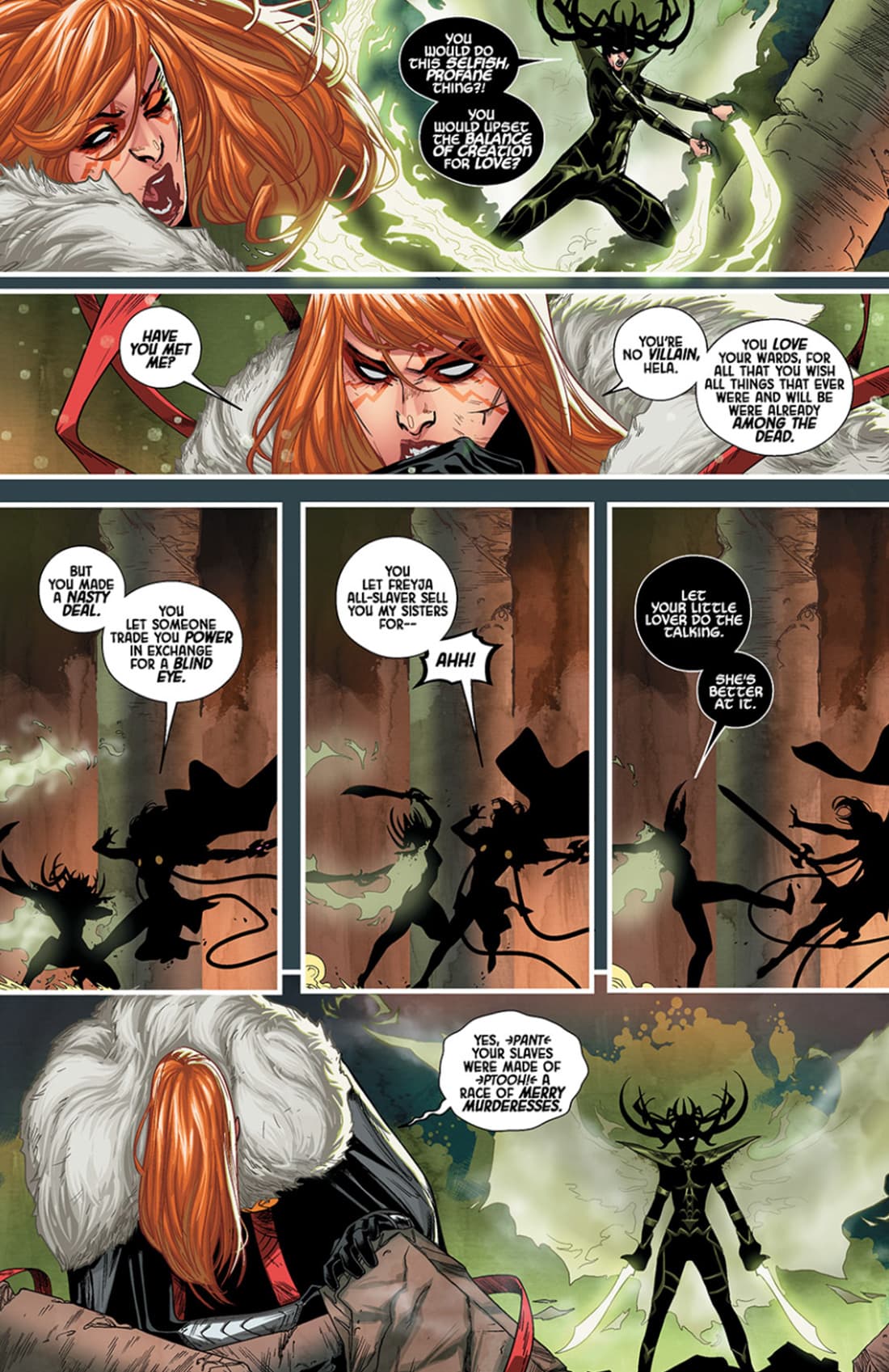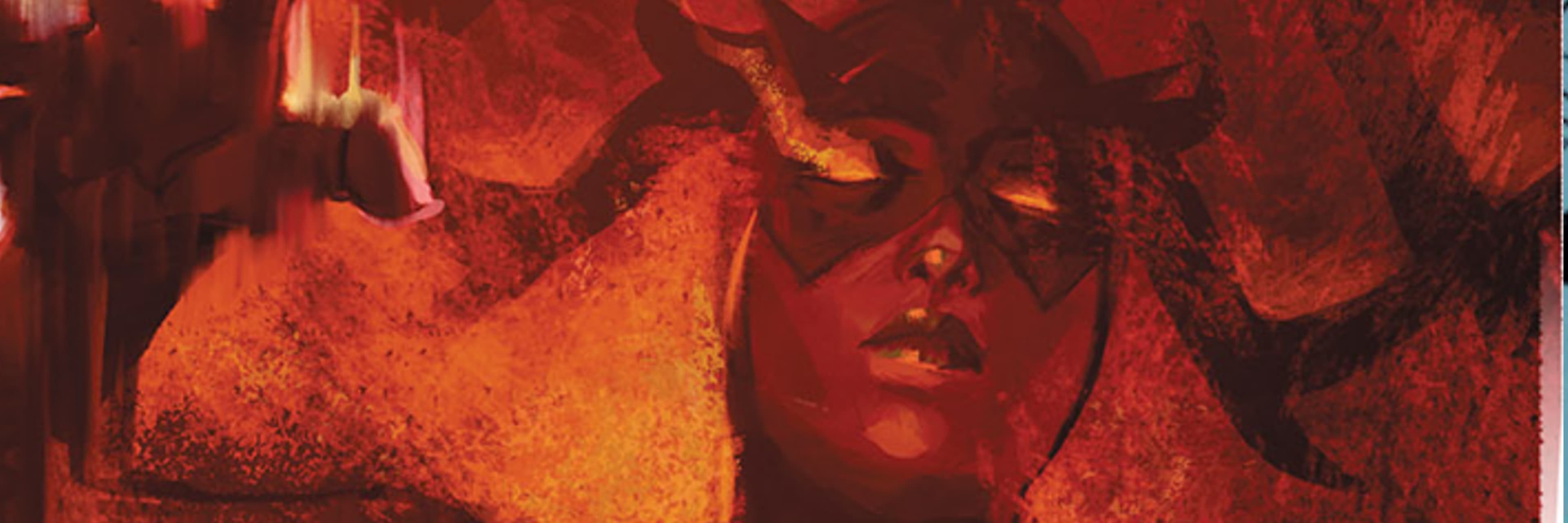
Hela
Biography
Biography
HELA
Hela, the Asgardian Goddess of Death, rules two of the nine realms: Hel, land of the dead, and Niffleheim, land of eternal ice. With a simple touch, she can cause gods to perish, but Hela's purpose is to receive Asgardian souls, as well as their followers.
She is known for her jealous wrath, her lust for ruling Valhalla, and her perpetual quest for both Thor and Odin's souls. Though, as she holds power over life as well, she can be forgiving when it comes to matters of the heart and personal sacrifice, restoring souls when it warms the dark corners of her heart—or when it helps to defeat her rivals.
Ruler of the Underworld Realms
Hela is the child of Loki, God of Mischief, and the giantess Angrboda. Hela's face is withered and decayed because she was mystically born half dead, but wears a cloak that conceals this imperfection, and while wearing it, she appears to be a beautiful woman. This cloak is where much of her power resides—in the same way that Mjolnir represents Thor's godhood.
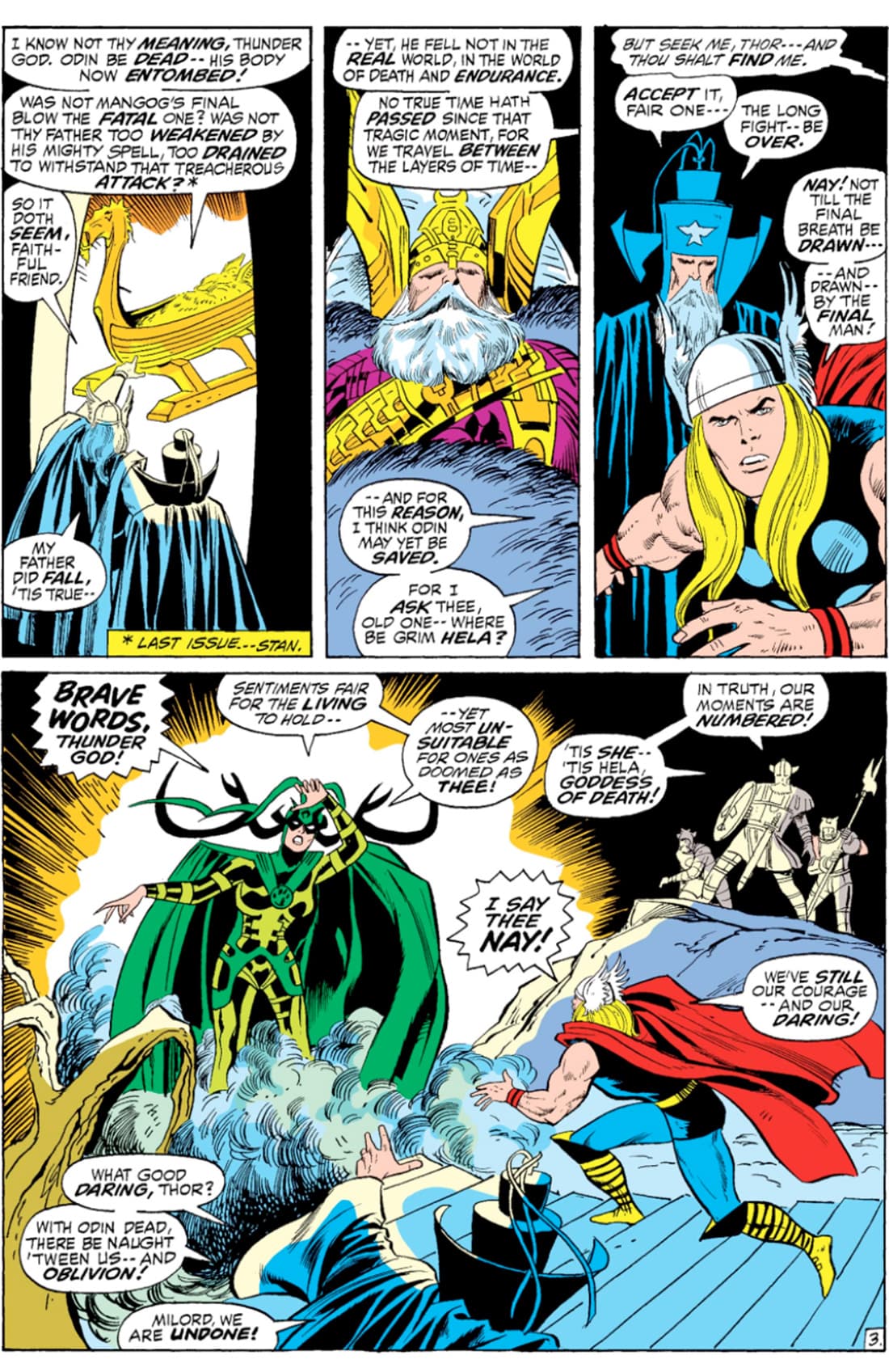
With the powers bestowed by her cloak, she can control the remains of those that reside in her realms, but that ability isn't enough to satisfy her. Hela's lust for power and her tendency towards jealousy leads her to attempt to usurp Valhalla and the Valkyrior.
She also plays a pivotal role in Ragnarok, a cyclical apocalypse for Asgard. Part of her role was to oversee the construction of a ship, the Naglfar, which is built from the fingernails of the dead and rains destruction over the Nine Worlds as her father Loki leads the forces of evil into their final battle with the Asgardians.
A Cloak of Many Powers
While Hela is long-lived and possesses superhuman strength like the other gods of Asgard, her cloak gifts her several unique powers. She casts bolts of energy, causing her targets to grow old, wither, or die. Hela can restore recently deceased gods back to life, provided their souls have not yet passed into the afterlife. She can also project a variety of destructive magical blasts and concentrate her power in one hand, granting her striking power to rend even the strongest Asgardian flesh; Hela calls this ability her “hand of glory.”
The Goddess can teleport across the nine realms, open portals through time, and levitate. Hela also casts illusions and can alter Hel’s appearance. She also releases her spirit as an astral projection, which retains much of her powers.
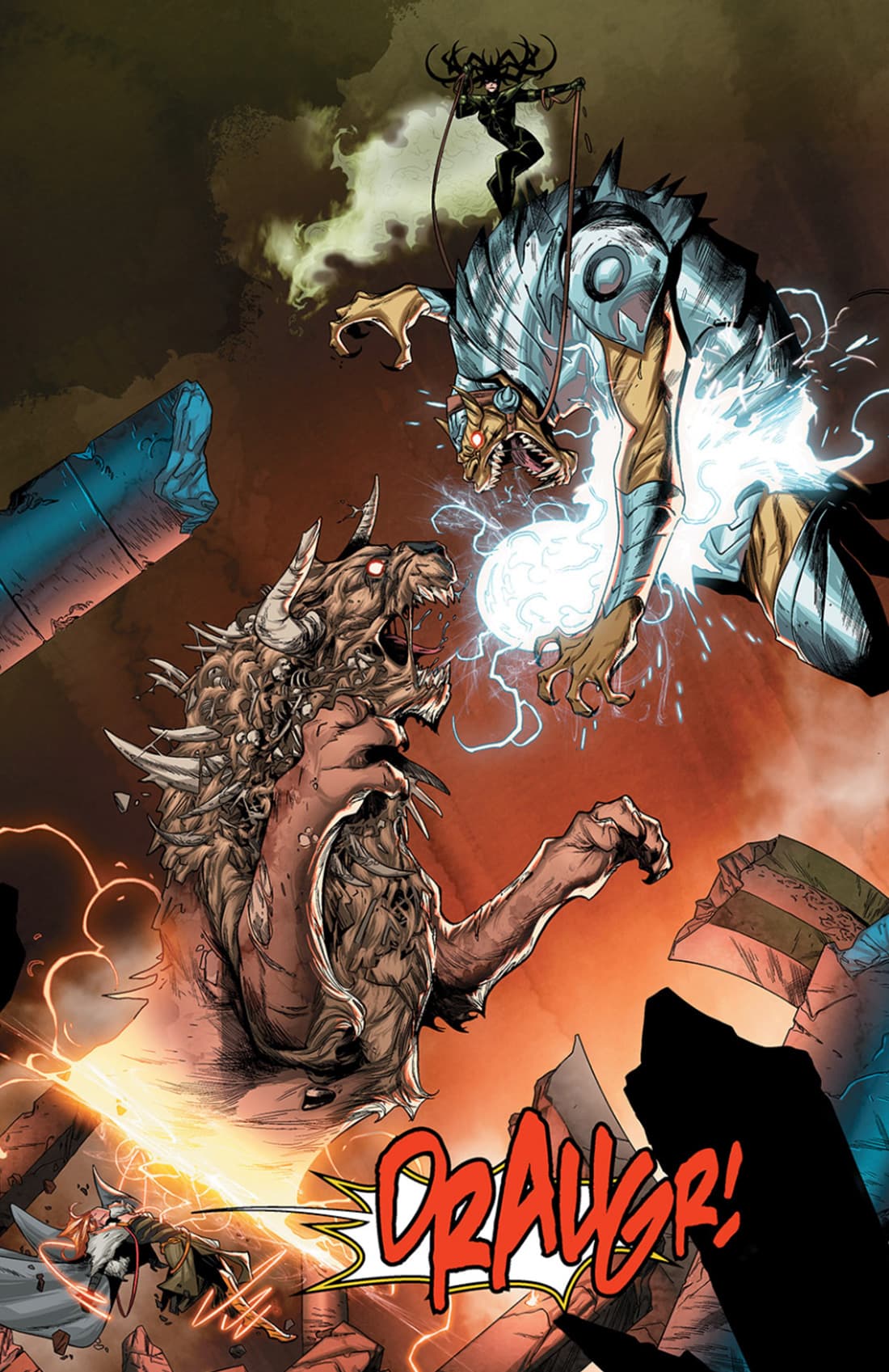
Hela is weakened without her cloak—so much so she cannot keep herself standing or cast magical power. It's theorized that without her cloak, she cannot leave her two realms.
Divine Rivals
At times, Hela's family members prove to be her foes. Her grandfather Odin and uncle Thor repeatedly thwart her bids for more power. Odin commands her obedience in her role as death goddess, and Thor fights her when her hunger for power grows too high and when he tries to defeat death itself.
Pluto, the Olympian God of death, is both rival and ally having proved the former when he invades Asgard to claim Odin's soul.
The Asgardian Ollerus seeks to supplant Hela in Hel and amasses an army to conquer the lands of the dead.
Odin's Valkyrior is pit against Hela because she wants to rule their realm of Valhalla where the honored dead go after they have been slain.
The Demogorge, or the great devourer of gods, poses a deadly direct threat to Hela. While he can kill her, she also can be brought back to life by other gods willing to do so.
When Skurge the Executioner is sent to Hel to help retrieve mortal souls, Hela tricks him to stay. To spite her for her illusions, he destroys her ship Naglfar.
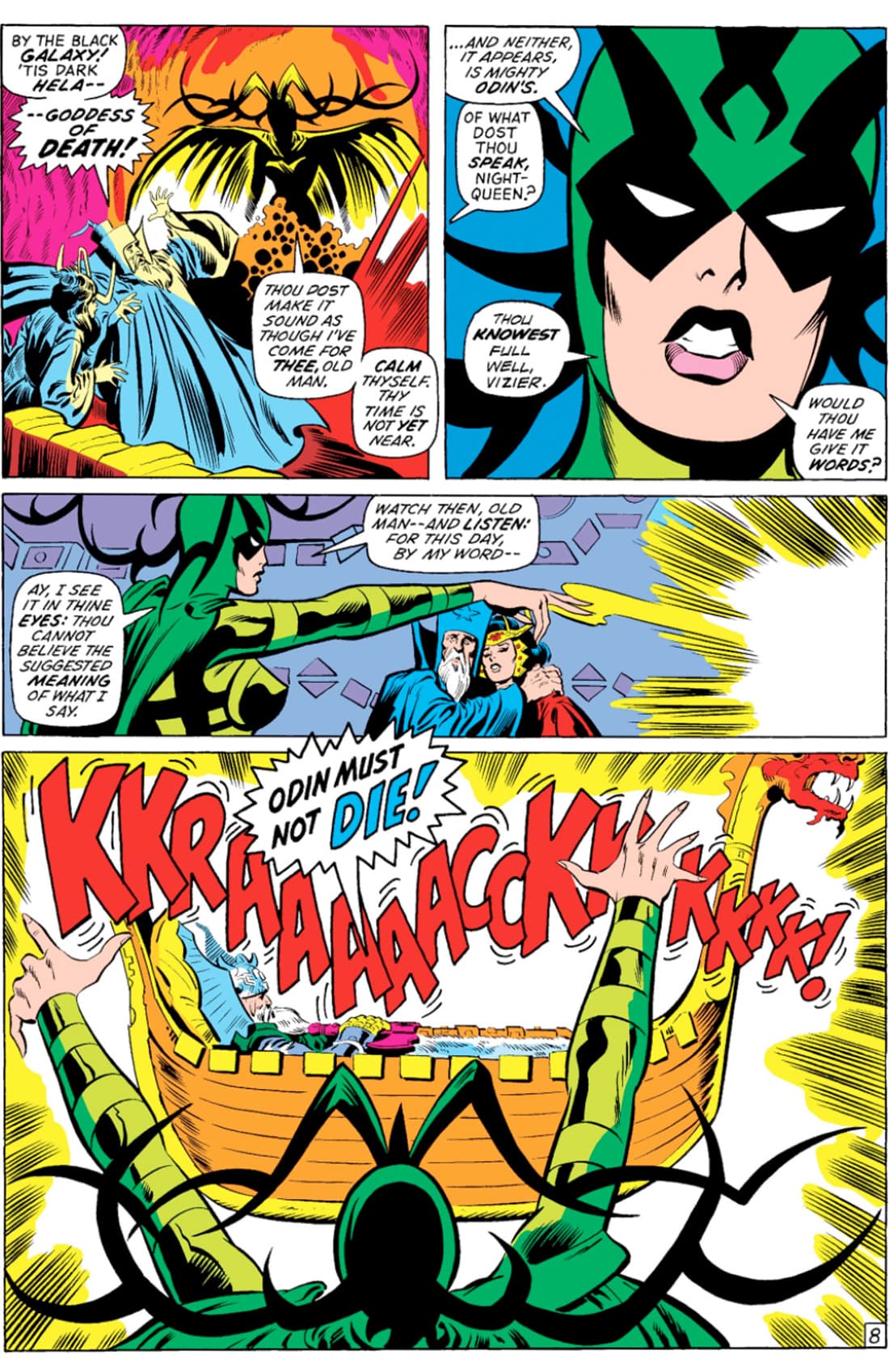
The Asgardian Angela seeks to free the Angels of Heven who raised her as well as her lover Sera, from Hel. In her effort, she defeats Hela in her own realm but spares her in hopes Hela sees the error of her ways. She frees the Angels, sending them to Elysium, and rejects becoming Queen of Hel, handing the regency to her brother Balder.
Angelic Allies
Loki, as Hela's father and the God of Mischief, is one of her few allies whom she partners with to bring about Ragnarok, the end of Asgard.
Hela has formed alliances with other death gods such as Pluto, the Olympian God of the dead, and has held court with many rulers of demonic realms such as Blackheart, Dormammu, Mephisto, and Satannish.
The Prophetess Volla who has powers of precognition is a dead spirit that resides in Hel. Hela relies on her council and employs other dead spirits such as the Silent One to do her bidding.
Fenris Wolf and the great Wolf Garm are Hel beasts under the servitude of Hela. Garm guards the entrance to Hel and resides at Gnipa cave. Fenris Wolf is loyal to Hela, and acts as her pet.
HEIGHT
7'
WEIGHT
500 lbs.
GENDER
Female
EYES
Green
HAIR
Gray
Universe
- Marvel Universe
Other Aliases
- None
Place of Origin
- Unrevealed, allegedly Jotunheim
Identity
- No dual identity
Known Relatives
- Angrboda (mother, deceased), Loki (father), Fenris Wolf (brother), Midgard Serpent (brother), Laufey and Farbauti (partneral grandparents, deceased), Varcolac and Echidna (maternal grandparents), Phorcys and Ceto (maternal great-grandparents), Set (maternal great-great grandfather)
Powers
- Illusion-Casting,
- Powers of Life and Death,
- Superhuman Strength,
- Energy Blasts,
- Astral Projection,
- Teleportation
Group Affiliation
- Asgardians
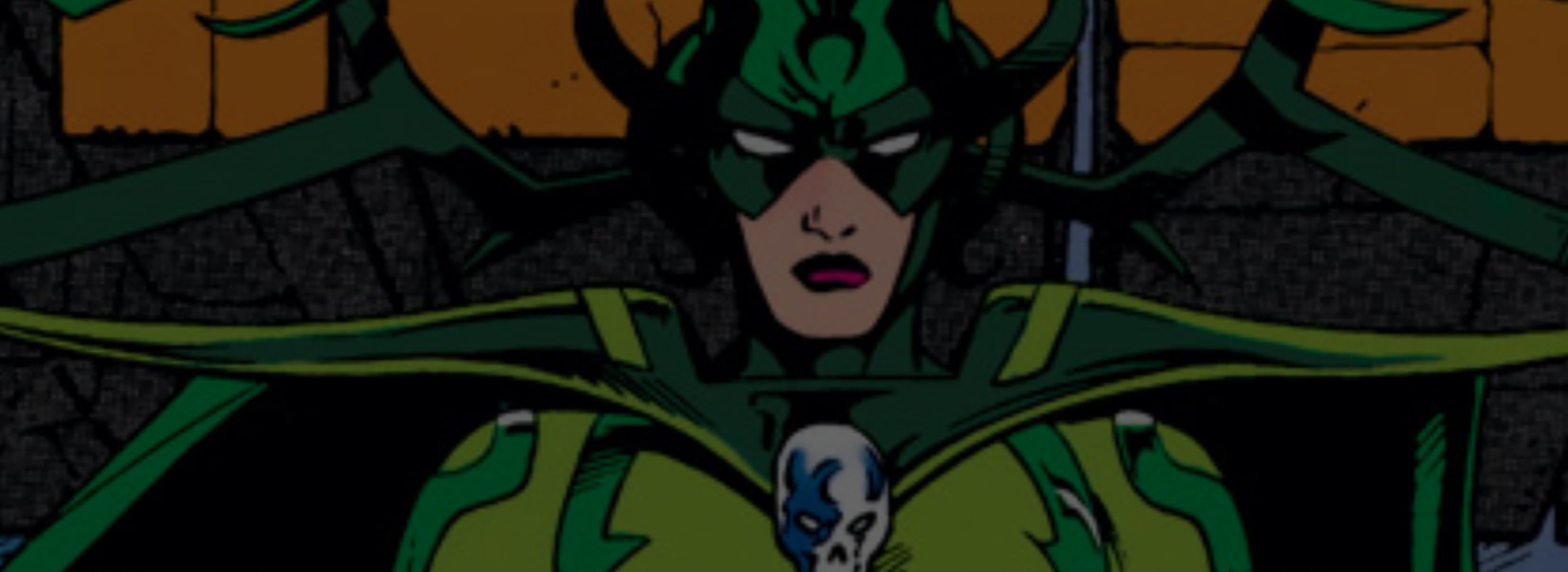
Death Story
When Hela promised the Storm Giants' King Rugga immortality in exchange for his prisoner Sif, she encountered the Mighty Thor—her uncle—who then came to Sif's rescue. Impressed by his bravery to sacrifice himself for Sif, Hela let them both go free.
Hela’s duty as the Goddess of Death is to receive the souls of departed Asgardians and their followers. When the decline in the worship of the Asgardians on Earth curtailed her acquisition of mortal souls, she made a pact with Odin that she would no longer claim them. Though, soon after, she went against the pact and Thor again confronted her, ultimately releasing the souls.
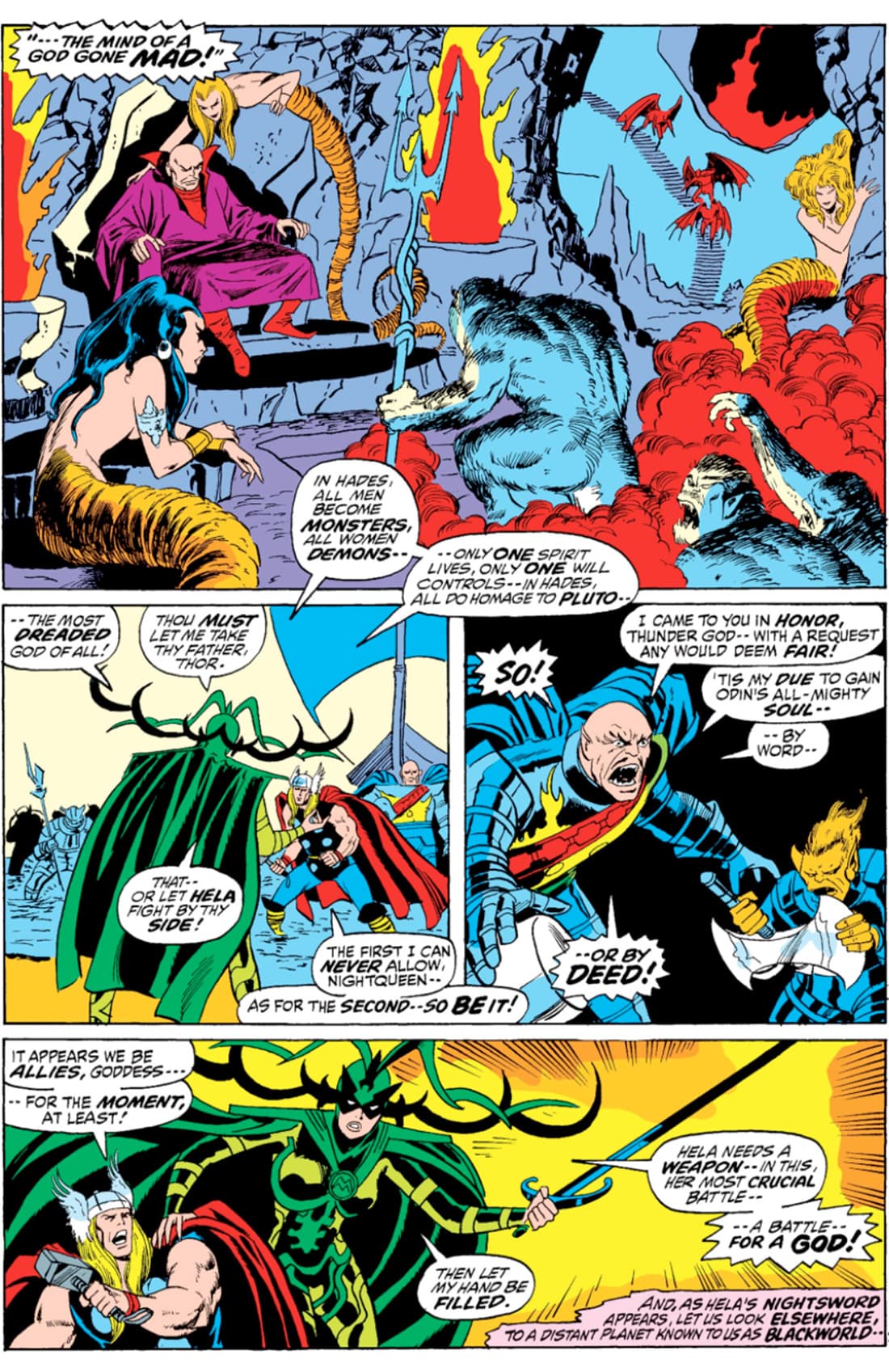
Throughout Asgard's history, she tempted Thor many times to give up his life. When Thor was faced with death and beaten by the Wrecker, Dirk Garthwaite, he refused Hela’s call and recovered his strength, claiming he had a spark of life . Hela came for him again when Thor thwarted her from nearly destroying existence after she drew power from Odin during his Odinsleep, which originated from the cosmic conceptual being Infinity . Thor drove out Hela's corrupted Infinity and, enraged, she vowed to take his life, but Odin intervened and slayed Hela to save his favored son—though Thor, recognizing she must exist to maintain the balance of life and death, convinced his father to revive her. Restored to life, she quickly casted an aging spell on Thor, but Sif came to Thor's aid and pleaded with Hela to spare him. Again, moved by their love, she let him live .
When Odin fell in a battle with Mangog, Pluto the Olympian God of Death invaded Asgard to claim Odin's soul . Hela, seeing Pluto as her rival, thwarted him by restoring Odin to life .
Another rival of Hela's, Ollerus, attempted to supplant her by amassing an army to conquer the lands of the dead. During this uprising, Hela seized power in Vahalla through the barbarian warrior Harokin who commanded their armies and the Valkyrior against Ollerus. Amidst his company was Barbara Norriss, a mortal possessing the form of the Valkyrie called Brunnhilde. Brunnhilde's allies, the Defenders, came to Hela's aide and helped overpower Ollerus. He was defeated, and Hela ceded rule of Valhalla to Harokin .
She later retook Valhalla by enthralling Harokin after her failed attempts at claiming Thor's soul and forestalling Ragnarok. Odin sent the Valkyrior to liberate Valhalla, but Hela slew them all so Odin would feel her loss. It was Odin's pity that inspired Hela to withdraw from Valhalla and restore the Valkyrior to life.
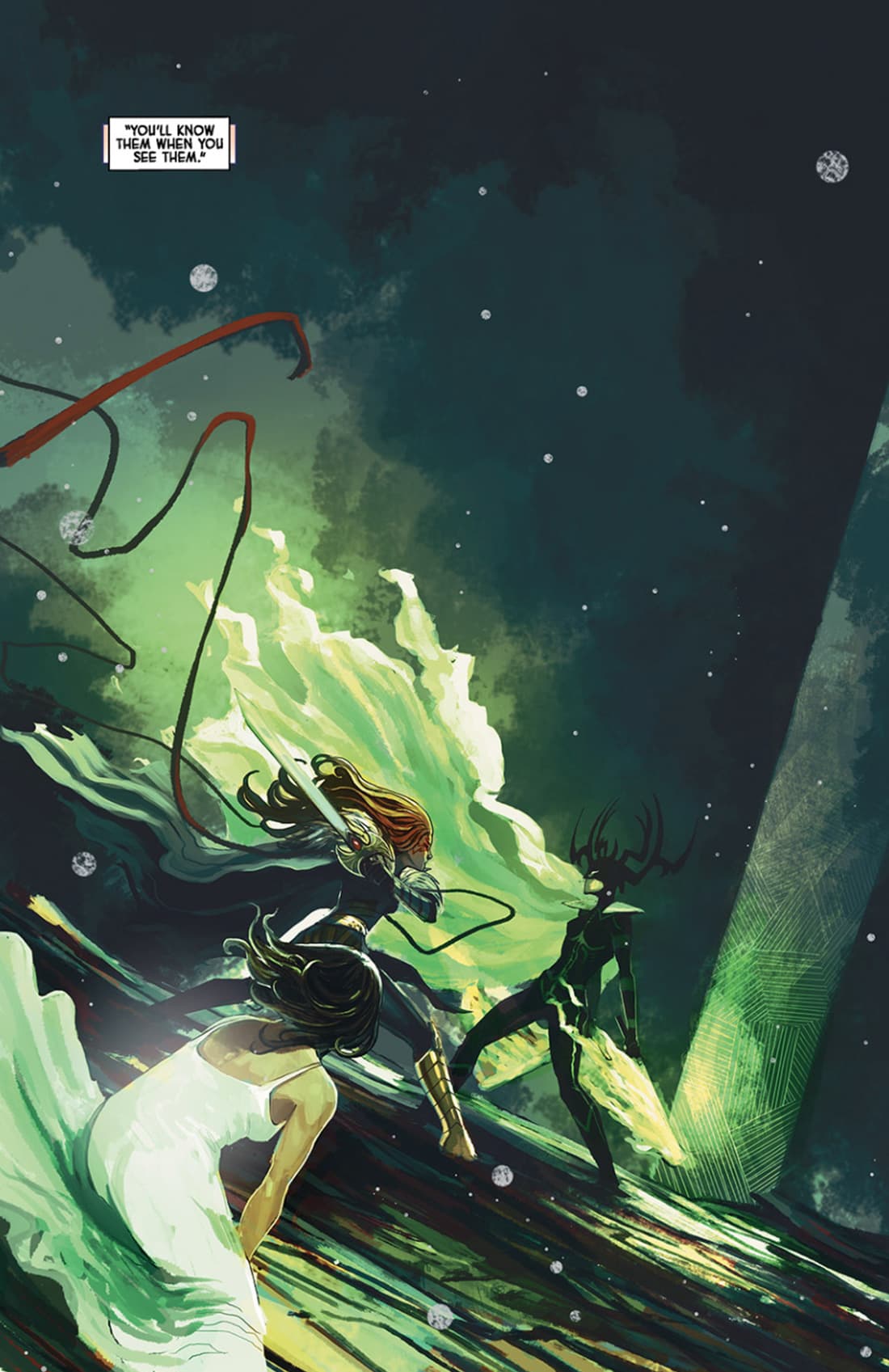
Hela was later swayed by other death gods to consolidate power and merge their realms into one, but the nexus they created by joining their energies awoke the Demogorge, the great devourer of gods. The Demogorge consumed Hela, but Thor saved her and drove out the Demogorge, who undid the death gods’ pact.
Malekith the Dark Elf bargained with Hela during his time on Earth as an agent of the fire demon Surtur; the bargain they struck was that any slain humans would be dispatched to Hel. It was soon after this bargain that Surtur and Odin became engaged in an eternal battle, resulting in their apparent deaths.
When the X-Men and New Mutants visited Asgard, Hela attempted to claim Wolverine’s soul, but Mirage used her newly-bestowed status as a Valkyrie to hold her back.
Without Odin to keep Hela in check, Thor took a new charge, leading forces into Hel to retrieve mortal souls. He did so alongside Valhalla’s Einherjar, the honored dead, Balder the Brave, and Skurge the Executioner. Thor deprived Hela of her cloak and, in defeat, she chose to bargain with him—if he promised to leave with his forces immediately, he could take the mortal souls with him. A bargain was struck, but Skurge was kept behind under Hela's thrall. Once he realized the trickery, he destroyed the ship Naglfar
Skurge gave his life to hold back the armies of the dead at Gjallerbru. Hela was frustrated by her defeat and cursed Thor so he could not die, but rendered his bones brittle and difficult to heal.
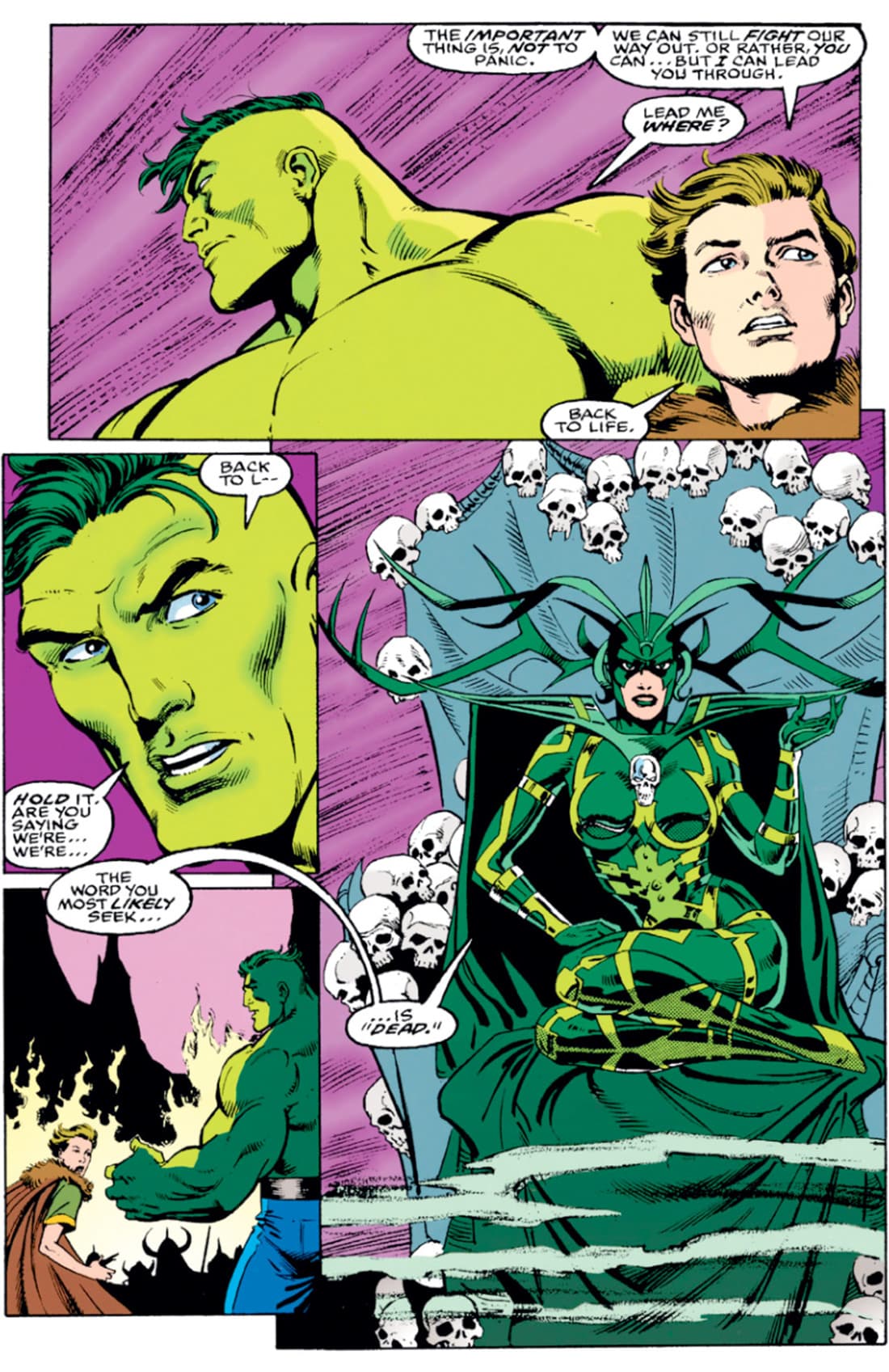
Thor’s enemies soon learned of Thor's curse through Loki, and after a battle with the Midgard Serpent, Thor’s body was gelatinized. Thor’s spirit then inhabited the indestructible Destroyer and rampaged through Hel, seemingly out of control and even threatening Skurge’s spirit when he tried to halt the rampage. Fearful, Hela restored Thor’s body to normal, learning only then that the God of Thunder was in control of the Destroyer all along. Nonetheless, Hela was impressed with Skurge and sent him to Valhalla.
Odin was restored to Asgard, but this didn’t stop Hela from making a conquest of Asgard. She seized control of the Valkyrior including Moonstar. Hela forced the dwarf Eitri to craft the Uru-made Nightsword to slay Odin while he was in his Odinsleep, but the New Mutants opposed Hela via a weak point Eitri had made and destroyed the Nightsword, forcing Hela back to Hel.
Hela was briefly deposed when the spirit of the sorceress Lorelei inhabited the Destroyer (which was left in Hel since Thor returned to his own body), but Sif and Balder helped Hela imprison the Destroyer.
